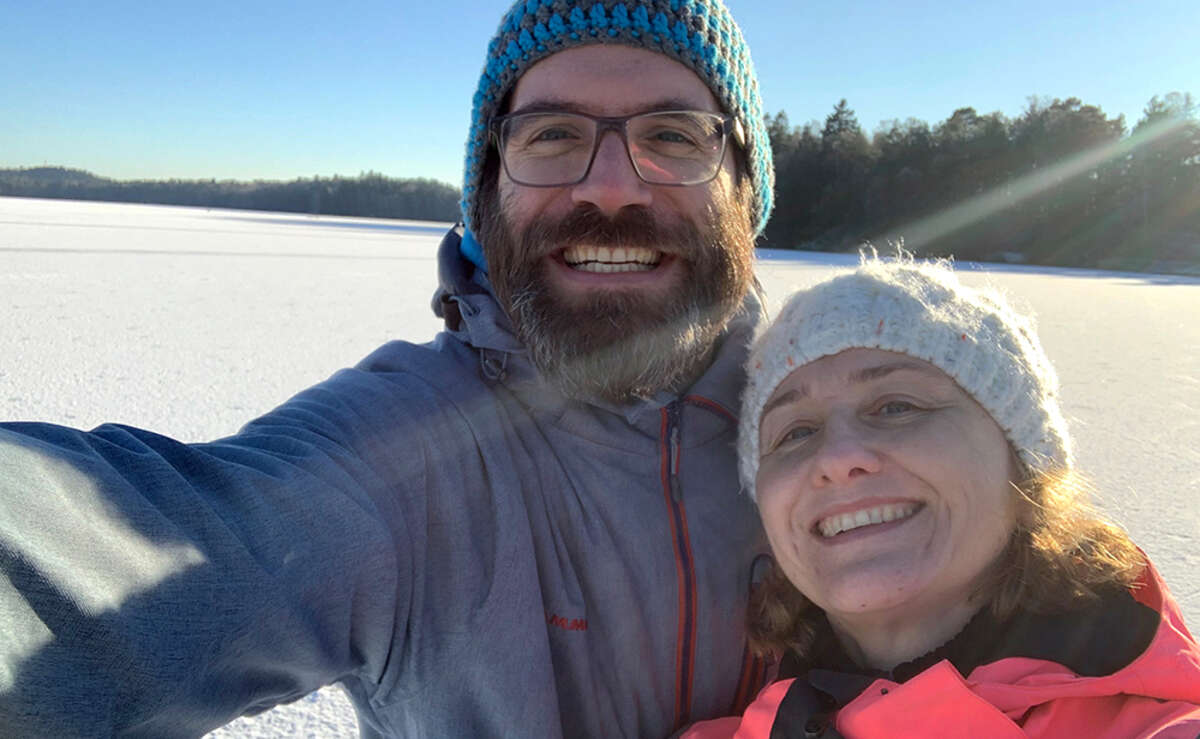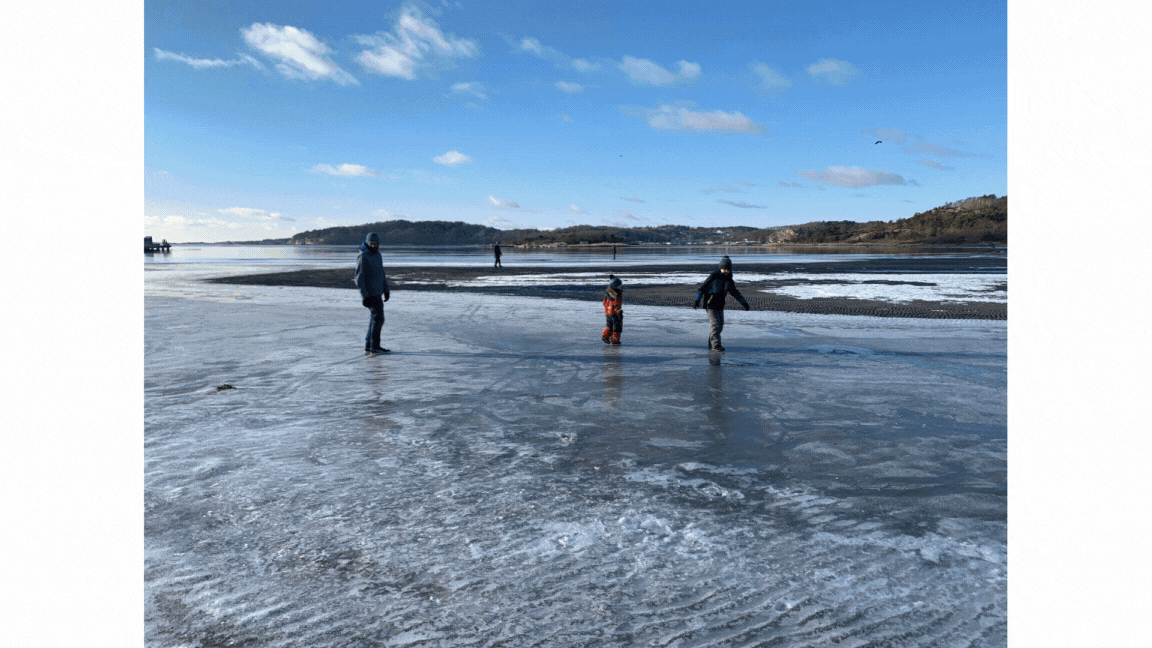She says, he says: With kit and caboodle to Sweden
February 2024
Both are researchers at the University of Gothenburg: he is a professor; she is a senior scientist. They both once worked at the Biozentrum and are a couple. Five years ago, Irena and Björn Burmann moved from Basel to Gothenburg with their children. In our Alumni Newsletter, they talk about their settling in Sweden and the challenges of balancing family and career. We interviewed each of them separately.

You visited the Biozentrum on World Alumni Day in 2023. How was it?
Irena: Yes, we did. It was a family trip to Basel. Our youngest son was born in Basel, and he was especially excited to see his birthplace. It was wonderful to meet all our former colleagues and friends. The weather was great, and we went swimming in the Rhine, just like we did when we lived in Basel.
Björn: I enjoyed reconnecting with people and seeing how much has changed in the meantime. It was my first opportunity to visit the new Biozentrum in person – a fancy building. Just as a little spoiler, we have also recently moved into a modern, airy new building here. (he smiles)
How do you remember your time at the Biozentrum?
Irena: My time at the Biozentrum was short, only three years, but it is filled with fond memories. We used to have these little floor parties every month. We were a tight-knit community, partly because we shared equipment, which was very helpful, but also because we discussed a lot about our research.
Björn: That was really an important and positive time for me. A lot was going on, both in research and in my private life. I joined the Biozentrum right after completing my PhD and left as an independent scientist with my own ideas. During this period, I developed to the point where I was able to start my own research group. And although it may not seem so in retrospect, I didn’t have a strategic master plan with the aim of becoming a professor.
You both work in similar research fields. How did you meet?
Irena: Actually, that’s quite a funny story. We first met in Bayreuth. In the lab. Everyone in my group spoke German. Björn, who had just arrived from Stockholm, was introduced to us in English. We were convinced he was Swedish … also because of his first name. So, for a good six months, I spoke to him in English. However, one day I said to him: “Your German is actually very good.” And he replied: “Yes, we speak German at home, too.” It never crossed my mind that he was German! (she laughs)
Björn: Our paths crossed in Bayreuth. We worked in the same research group, I as a PhD student and Irena as a postdoc. At first, we were close friends and then one thing led to another and we became a couple.
Did you also do research together?
Irena: Yes, in the beginning, but then I changed my focus. Back then, NMR was mainly used to study small proteins. But I was interested in large, physiologically relevant proteins. That’s why I joined a physiology group at the University of Freiburg in Germany. There, I started to work with patient samples and learned new techniques, such as cryo-electron microscopy. In Basel, I returned to NMR.
Björn: Actually, we only had overlapping research projects at the Biozentrum, in Sebastian Hiller’s group. Before and after that time, we never worked on the same topics. Irena’s research tackles completely different questions, even today. I would say our work complements that of the other.
How did you find your way to Basel?
Irena: I already lived in Freiburg. Björn then moved in with me and commuted to Basel. Later, I also got a position at the Biozentrum. However, as young parents, commuting was no longer an option for us. Organizing our daily life was challenging: planning who picks up the children from day care and when etc.. And commuting is more or less lost time. So, we decided to move to Basel.
Björn: That’s Irena’s doing (he laughs). She moved from Bayreuth to Freiburg and I followed her because we got tired of the long-distance relationship. So, I started looking for job opportunities in Freiburg and region. At that time, Sebastian was looking for a postdoc. That’s how I ended up at the Biozentrum. I commuted for two to three years. When Irena also got a job at the Biozentrum, it was clear that we would move to Basel.

You moved to Sweden five years ago. Was that a joint decision?
Irena: I have always loved the North. And since Björn was Swedish in my eyes (she laughs), it was a perfect fit for both of us. After checking everything, we jointly decided to make the move. That way, one of us could continue research. And I was confident that I would later find a job too.
Björn: At some point, it became clear that my time at the Biozentrum was coming to an end. So, I applied for various positions in Europe and had several offers. We then looked at what would be best from a family and scientific point of view. And so we chose Gothenburg. I must admit that I have always had a certain affinity to Scandinavia. My family spent their summer vacations in southern Norway for decades. When I visited Gothenburg for my job interview, that special feeling immediately came back. (he laughs)
How was it in the beginning?
Irena: The first year was tough. Two young kids, a new country, a new language, and a new culture. I should have planned everything more in advance, but I was pregnant and had other things in mind. In that first year, I couldn’t look for a job because the kids only start daycare after they turn one. In Sweden, it’s common that both parents take a year of parental leave. But this wasn’t possible for us. Björn had just started his new job and I didn’t have one yet. I felt more or less stranded.
Björn: You basically start from scratch. It was exhausting and took a lot of effort to get everything running. In Sweden, you need a personal identity number for everything. If you don't have one, you practically don't exist. There was just so much to organize. Even finding an apartment wasn't easy – we moved three times that first year. And getting to know the new colleagues also took time. The mentality is quite different. Initially, I got strange looks when people found out that I wasn’t on parental leave. That’s very unusual here.
Do you speak Swedish?
Irena: Yes, that was important to me. I soon attended an intensive Swedish course – eight hours a day. After three months, I started speaking Swedish. You can get by with English, but one should learn the local language. It also helps you to make friends.
Björn: I am the “black sheep” of the family. (he laughs) I always say that I don't have time for it. In a way, that's just an excuse. But I understand quite a lot and can follow conversations. At the moment, I don't have the motivation to push myself.
Do you feel at home now?
Irena: I think so. Sometimes I miss the South, especially in winter. What I really appreciate here is the balance between work and family life. I go home in the afternoon without a bad feeling … everyone does. And no meetings after 4.30 pm. So, we often pick up the kids together in the afternoon.
Björn: Yeah, definitely, even though we are obviously not a typical Swedish family. We still cultivate our own traditions. What I like here is the relaxed attitude in some aspects. For example, we don’t have important meetings in the late afternoon. And it’s also okay to say: Sorry, I have to pick up my kids from daycare. It’s different in German-speaking countries. Here, everything is organized to ensure that both parents can contribute to family life. And working from home was common even before the COVID-19 pandemic.
You are a team, at work and at home. How does it work?
Irena: Yes, I work in two groups, spending about half my time in Björn’s team. Recently, I told him to shave, otherwise he would look like my other boss. (she laughs) I am not afraid to speak my mind openly, whether it’s in the lab or at home. At work, we usually do our own stuff. But when I have a brilliant idea at night, I sometimes can’t resist and wake up Björn. All in all, it works pretty well. It is only in the kitchen that I hold the reins.
Björn: We work together where we have overlaps. But generally, each of us is our “own boss”. Nobody tells the other what to do. However, Irena is the boss in the kitchen. I stay out of it; cooking is not really my domain. I take care of other household and family tasks.
What are you currently working on?
Irena: The focus of my research is on neurophysiology and neurodegeneration in the brain. I am studying tau proteins in Alzheimer’s and alpha-synuclein in Parkinson’s disease. Björn and I started working on this with Sebastian. Initially, I assisted with the production of proteins for tests in the hospital. Over time, the project became increasingly exciting and has now turned into a passion project.
Björn: We are still highly interested in understanding how proteins work. One topic is neurodegenerative diseases. We want to understand what goes wrong in these conditions. The other topic deals with the transcription machinery. How is it regulated in detail? There are still many open questions.
What fascinates you about your research?
Irena: That I can work with patient samples and investigate what happens with the proteins. And learning what the differences are between healthy and sick people. This is important for diagnostics. Sometimes, it makes me sad to see what happens to our bodies, for example in dementia. Unfortunately, my own mother is suffering from dementia.
Björn: The unexpected. I have experienced that results are often different from what I expected. You have to be open and accept that things sometimes take a new turn.
How was your childhood and study?
Irena: I grew up in the former Yugoslavia. When I later started studying in Zagreb, the war had just begun. We experienced air raids. Once, a cluster bomb fell near the university. That time was dreadful. Since then, I have been a pacifist at heart. After graduating, I moved to Linz, always with the idea of returning to Croatia. But in between life just happened.
Björn: I had a very unspectacular childhood in a small town in Germany. After finishing high school, I started studying in Bayreuth. And I must admit, I still benefit to some extent from the broad knowledge I gained during my studies.
How would you complete this sentence: If I wasn't a scientist, then...
Irena: ...I would have become a flight attendant. (she laughs.) As a child, I always wanted to be a stewardess because I thought they travel the world. I could also imagine being a documentary filmmaker. I have always been a globetrotter.
Björn: ...I would probably be a sports journalist. In my youth, I was extremely interested in sports.


